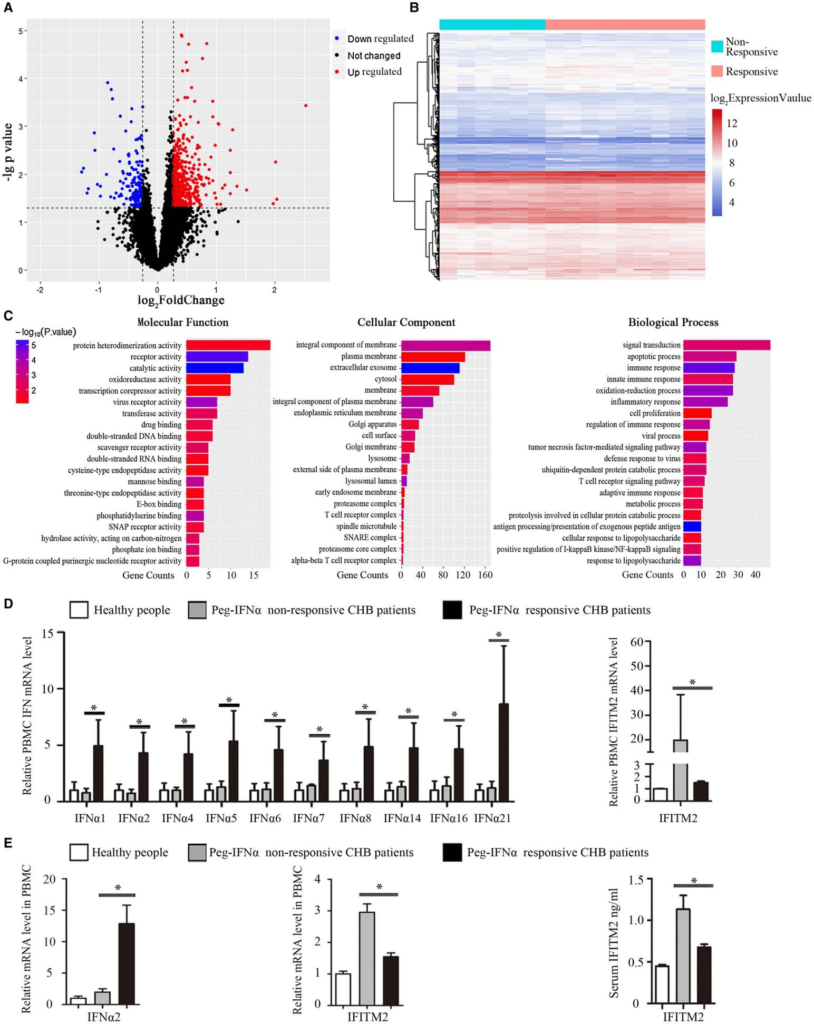FineTest Elisa kit contributes to the research on infectious diseases. The immunoassay is designed to measure IFITM2 concentration in serum.
Publication Details
Article Title: Exosomal Interferon-Induced Transmembrane Protein 2 Transmitted to Dendritic Cells Inhibits Interferon Alpha Pathway Activation and Blocks Anti–Hepatitis B Virus Efficacy of Exogenous Interferon Alpha
Journal Title: Hepatology
DOI: 10.1002/hep.30548
IF: 17.425
PMID: 30723923
Abstract: The negative regulators in the interferon (IFN) signaling pathway inhibit intrahepatic immune response, resulting in suboptimal therapeutic response to IFNα treatment in chronic hepatitis B (CHB) patients. Identifying the key negative factors and elucidating the regulating mechanism are essential for improving anti-HBV (hepatitis B virus) efficacy of IFNα. From the Gene Expression Omnibus (GEO) database, we downloaded and analyzed gene expression profiles of CHB patients with different responses to IFNα (GSE54747), and found that innate immune status was associated with the IFNα-based therapeutic response in CHB patients. Through PCR array, we found higher baseline level of IFN-induced transmembrane protein 2 (IFITM2) mRNA and lower baseline level of IFNα mRNA in peripheral blood mononuclear cells (PBMCs) of CHB patients with suboptimal response to IFNα treatment. Increased IFITM2 protein was also found in the serum of IFNα nonresponsive patients. With further experiments, we found that overexpressing IFITM2 in Huh7 cells suppressed endogenous IFNα synthesis by inhibiting phosphorylation of extracellular signal-regulated kinase (ERK), TANK-binding kinase 1 (TBK1), and interferon regulatory factor 3 (IRF3); knocking out IFITM2 enhanced activation of the endogenous IFNα synthesis pathway, exhibiting better inhibition on HBV replication. We also found that IFITM2 protein was shuttled by exosomes to dendritic cells (DCs), the main source of endogenous IFNα. Exosome-mediated transport of IFITM2 inhibited synthesis of endogenous IFNα in DCs whereas the inhibitory effect was abolished when IFITM2 was knocked out. Furthermore, we demonstrated that both palmitoylation inhibitor and mutation on 70/71 sites of IFITM2 protein influenced its incorporation into exosomes. Mutated IFITM2 protein increased the effect of IFNα against HBV. Conclusion: Exosome-mediated transport of IFITM2 to DCs inhibits IFNα pathway activation and blocks anti-HBV efficacy of exogenous IFNα. The findings provide an explanation to the suboptimal response of CHB patients to IFNα treatment.
Keywords: Coculture Techniques, Cohort Studies, Gene Expression Regulation, Hepatitis B, Chronic, Signal Transduction, Infectious Diseases
Immunoassay
| FineTest Product | Sample | Detection Target | Species |
| Human IFITM2(Interferon-induced transmembrane protein 2) ELISA Kit (EH9300) | serum | IFITM2 | Human |
Validated Image

Figure Source: Hepatology, 2019 Jun;69(6):2396-2413. doi: 10.1002/hep.30548.
FIG. 1. Analysis of differentially expressed genes (DEGs) between interferon responsive and non-responsive CHB patients: (E) Transcriptional levels of IFNα2 and IFITM2 in PBMCs of CHB patients and healthy people were measured by qRT-PCR, while serum IFITM2 level was quantified by ELISA.
